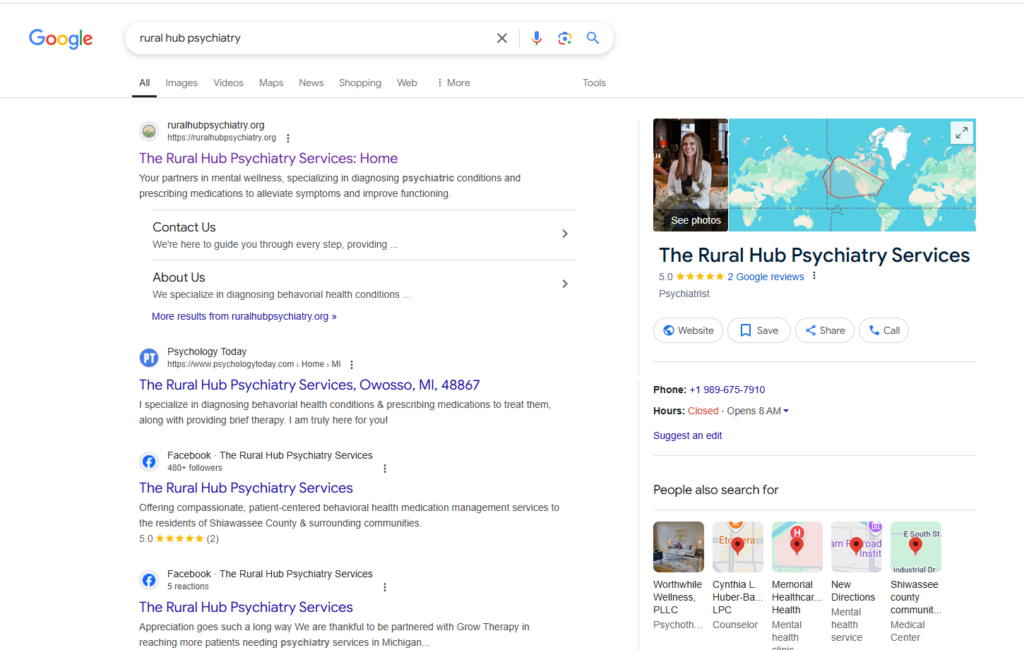How to Show Up First in Google for Your Business Name
We’ve had hundreds of web projects and almost all of them rank first for their business name on Google search. While many assume that simply having a website is enough, there’s more to the process. Your business name, website setup, and search engine optimization (SEO) strategies play a critical role. That’s why for us, building…
We’ve had hundreds of web projects and almost all of them rank first for their business name on Google search.
While many assume that simply having a website is enough, there’s more to the process. Your business name, website setup, and search engine optimization (SEO) strategies play a critical role.
That’s why for us, building SuperSites for our clients have key elements in place to ensure their Google search presence works in their favor even just a few weeks after they go online.
Here are some of our clients ranking first for their business name:




Why Ranking for Your Business Name Matters
When potential customers search for your business, they expect your website to appear at the top of Google’s search results. If it doesn’t, you risk losing credibility and traffic to competitors, online directories, or irrelevant results.
Key Principles for Ranking #1 on Google for Your Business Name
1. Choose a Business Name That’s Easy to Search
Pro Tip: Avoid overly complex, long, or hard-to-spell names.
✅ Use simple, memorable words that customers can easily type.
✅ Avoid special characters or numbers unless they’re integral to your brand (e.g., “7-Eleven”).
✅ Ensure your business name isn’t too similar to established brands.
Example:
- Good: “Lansing Dental Care” (clear, direct, location-based)
- Not Ideal: “XynFlare Innovations Inc.” (hard to spell, lacks clarity)
2. Make Your Domain Name Match Your Business Name
✅ Register a domain name identical or as close as possible to your business name.
✅ Use a .com domain if available, as it’s more recognizable and trusted.
✅ Consider domain alternatives like .co, .net, or .biz if necessary—but remember, .com is best for credibility.
3. Optimize Your Website for SEO
Your website is your most important online asset. Follow these best practices:
✅ SEO-Friendly Homepage Title: Include your business name and what you do.
✅ Meta Description: Write a clear, keyword-rich meta description for search engines.
✅ Google My Business Profile: Claim and optimize your Google My Business listing with updated business information, location, and operating hours.
✅Build some content: Google will tend to favor your site if it offers something of value for your website visitors!
4. Build Local SEO Citations
Citations are mentions of your business name, address, and phone number (NAP) on other websites like Yelp, BBB, or local directories. Ensure consistent NAP info across all platforms.
This is basically the first step you want to take if you don’t have other websites linking back to you just yet. This is your “free” link-building at the initial stages. Just make sure the directories you are registering for are legitimate so you don’t end up listing on a website that has bad SEO practices (this can get you penalized by Google!)
5. Collect Customer Reviews
Customer reviews are social signals that will help your website gain credibility. If you already have your Google My Business profile, get your friends and family to leave reviews!
✅ Encourage positive reviews on Google, Yelp, and other relevant platforms.
✅ Respond to all reviews (positive and negative) to boost trust and engagement.
Want to know more about how to get legitimate customer reviews? Read more on: Learn How to Thank Your Customers (and Get Feedback)
6. Avoid Generic Names That Are Hard to Rank
Choosing a unique and specific business name is crucial for ranking well on Google. Generic names like “Best Coffee Shop” or “Discount Tires” are extremely difficult to rank for because they’re common search terms with high competition.
✅ Be specific and unique—use a mix of what your business does and a unique brand identifier.
✅Including your location in your business name can make a significant difference in local SEO rankings. When customers search for services in a specific area, Google often prioritizes businesses with location-based names.
What to Avoid:
🚫 Overly Broad Names: “Best Shoe Store” – Too generic and highly competitive.
🚫 Difficult Spellings: “XynTek Solutions” – Hard to spell and remember.
7. Use Social Media for Brand Reinforcement
✅ Secure social media handles matching your business name on major platforms (Facebook, Instagram, LinkedIn).
✅ Be active and share content regularly to drive traffic and build brand awareness.
Make Your Business Name Google-Friendly
Showing up first on Google for your business name is achievable with the right mix of branding, website setup, and SEO strategy. Choose a simple, unique business name, create a well-optimized website, and invest time in SEO and local citations.
By following these steps, you’ll build a strong digital presence that Google can’t ignore—helping your business dominate search results and attract more customers. 🚀








